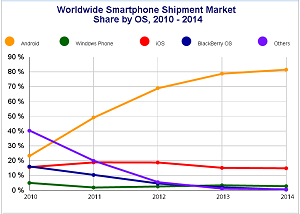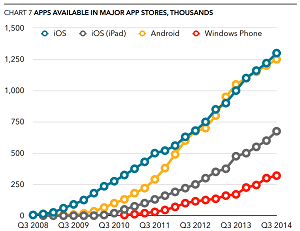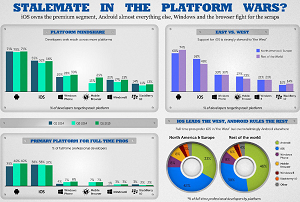The Last Gasp for Windows Phone
"iOS owns the premium segment, Android almost everything else, Windows and the browser fight for the scraps."
That's the conclusion of the latest comprehensive VisionMobile developer study, wherein more than 8,000 developers were surveyed about their OS targets of choice and myriad other details.
Despite a steadily growing developer mindshare and the differentiation of its technology, Windows Phone "is still not making any significant headway with device sales share, which is stuck at 3 percent," the study said. "Windows Phone is still fighting to build a sustainable niche but faces a vertical mountain climb before challenging the top two."
At about the same time, research firm IDC released data from its phone tracker project that pretty much reached the same conclusion.
"Windows Phone had the smallest year-over-year increase among the leading operating systems, growing just 4.2 percent, well below the overall market," IDC said.
"Instead of a battle for the third ecosystem after Android and iOS, 2014 instead yielded skirmishes, with Windows Phone edging out BlackBerry, Firefox, Sailfish and the rest, but without any of these platforms making the kind of gains needed to challenge the top two," said IDC's Melissa Chau.
 [Click on image for larger view.]
Smartphone Market (source: IDC)
[Click on image for larger view.]
Smartphone Market (source: IDC)
Jackdaw Research devoted an entire study to Windows Phone a few months ago and ended up with an equally bleak conclusion.
"Windows Phone is growing modestly in terms of shipments, but not enough to gain share," Jackdaw researcher Jan Dawson said in the report. "Both iOS and Android are growing faster, and although Windows Phone is now clearly the third ecosystem in the smartphone market, it remains a very distant third, with no immediate prospect of catching up."
 [Click on image for larger view.]
The "App-Gap," Visualized (source: Jackdaw Research)
[Click on image for larger view.]
The "App-Gap," Visualized (source: Jackdaw Research)
This must be incredibly frustrating for Microsoft, known for its focus on "developers, developers, developers ...." (Sorry -- I know that's the former CEO, but that video never gets old.)
Even though many developers have heaped praise upon Windows Phone, and with the release of version 8.1, reviewers such as Engadget said "it's clear Windows Phone has finally grown up," the OS can't make significant headway.
One of the main problems is kind of a catch-22 situation caused by the lack on inventory on the Windows Phone store compared to the "big two." Users are turned off by the poorer selection. Less marketing potential turns off developers, so fewer new apps are created, which further turns off consumers, and so on.
VisionMobile called this the "app-gap."
"Unfortunately, lack of scale means that the top new apps come to the Windows Phone platform quite slowly, if at all, and many others are not updated," VisionMobile said. "This leads to the vicious cycle of self-selection, also known as the app-gap -- most users who care about apps don't adopt Windows Phone and so in turn the platform isn't as interesting to the top developers."
 [Click on image for larger view.]
The iOS and Android Stalemate (source: VisionMobile)
[Click on image for larger view.]
The iOS and Android Stalemate (source: VisionMobile)
Which leads us to Windows 10 and "Universal Apps."
"Microsoft needs more apps and more developer loyalty for its Windows platforms, especially those running on mobile devices," wrote longtime Microsoft expert Mary Jo Foley in her March column for sister publication Redmond magazine. "By making the underlying Windows Runtime, Windows Store, Windows APIs and tooling more common across the many Windows flavors, Microsoft is making the idea of building more Windows apps a lot more appealing, so the argument goes."
Microsoft is certainly pushing that argument. Kevin Gallo penned a Windows blog last month claiming "Windows 10 is empowering developers to dream again."
"We are working to make Windows 10 a unified, developer platform for ALL of our devices so you can reach the greatest number of customers with your work across phones, tablets, PCs, Xbox, IoT devices, and the new Surface Hub and HoloLens opportunities," Gallo said.
"We’re also doing the work necessary to help make sure that apps and games look great across a full range of devices, display surfaces and input models," Gallo continued. "The Windows 10 platform will build upon the universal Windows app framework released with Windows 8.1 to provide developers the tools to deliver new app experiences across devices with a minimum amount of additional work."
Foley isn't so sure. "I don't think it's a slam dunk that Universal Apps will help close Microsoft's current mobile app gap," she said. "Far from it. But that strategy remains Microsoft's Hail-Mary hope with Windows 10, at this point."
Hopefully, she said, Microsoft will address the unknowns about Universal Apps next month at its big Build 2015 conference.
Dawson pointed out three things Microsoft needed to do to catch up, including providing more help to app developers, especially after the initial deployment. "Unless Microsoft does these things, and does them well, it will not achieve mass-market traction for Windows Phone in the near future, and it risks spending a great deal of money developing an OS and creating devices, which never catch on in a meaningful way."
(Btw, to update, I love Visual Studio, never tried iOS and haven't much enjoyed my Android Studio experiences. I'm totally rooting for the underdog here.)
Posted by David Ramel on February 26, 2015